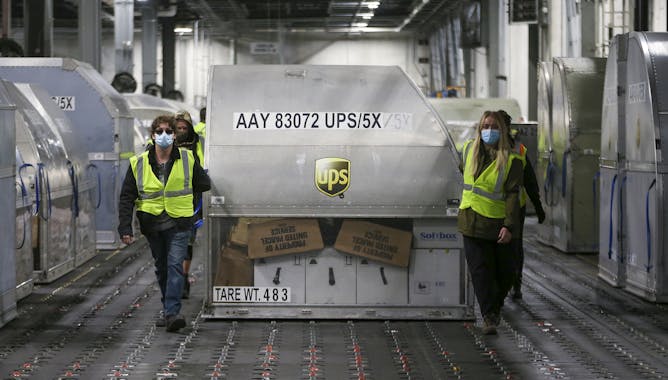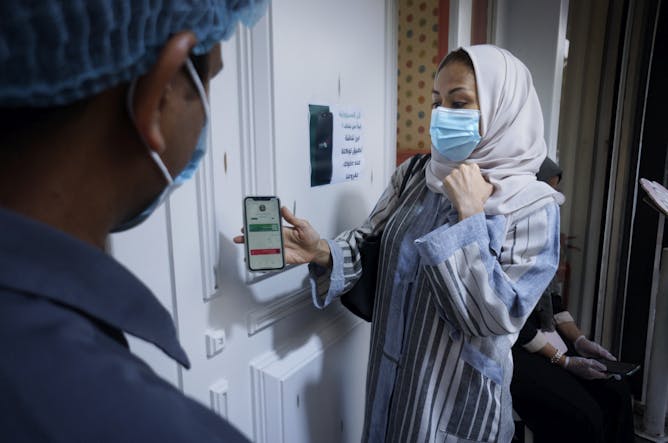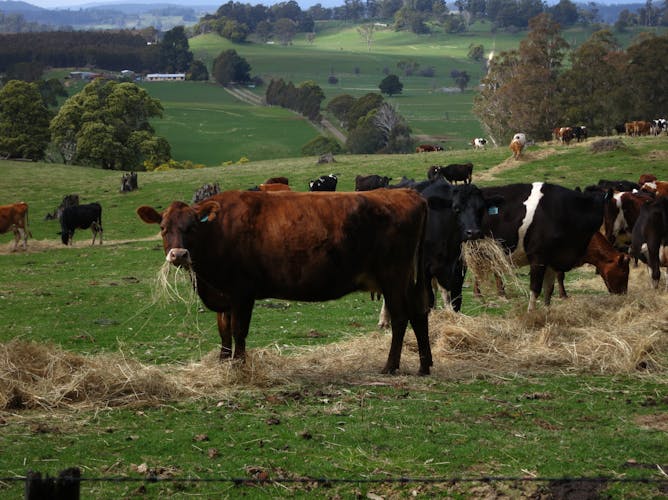|
|
|
|
If you’re like me, you’re starting to know people who have been vaccinated against COVID-19 – or at least had their first dose. This, of course, is wonderful news for them, but it does beg a couple key questions. How protected are they? And from the perspective of vaccine availability, should state health agencies get one dose into as many arms as possible, rather than prioritizing finishing two-dose regimes?
Dr. William Petri from the University of Virginia breaks it down for us, citing recent studies from Israel, the U.K., and a reanalysis of clinical trial data of the Pfizer vaccine. In short, Petri explains how a single dose provides some immune protection after about a week, but the second shot, for either the Pfizer or Moderna vaccine, is recommended to make it more effective.
As more Americans get vaccinated in the weeks and months ahead, will they need “vaccine passports” to travel to other countries or even enter a workplace? Tufts cybersecurity scholar Laurin Weissinger argues there are a number of security and privacy concerns with app-based vaccine passports, particularly if app developers seek to monetize this information by, for instance, combining it with personal health data. His advice? Use paper records, verified by a QR code.
We’ve all heard about the problem of methane produced by ruminants, such as cows. Two researchers from the University of California Davis just published a study showing that adding only one to three ounces of red seaweed to cow feed per day can reduce both methane emissions and feed costs without affecting meat quality. As for the taste, a panel of consumers could not tell the difference between beef from cattle that consumed seaweed and those that did not. And the cows themselves adapted quickly to the seaweed supplements.
For the rest of this week’s science and research news, please see the list below and reply to this email with stories you’d like to see covered.
|
Martin La Monica
Director of Editorial Projects and Newsletters
|

|
|

UPS employees roll out first doses of the Pfizer vaccine at the UPS hub in Louisville, Ky., on Dec. 13, 2020.
Michael Clevenger/Getty Images
William Petri, University of Virginia
The vaccine rollout is underway, but what happens if there is a supply disruption? Would it be feasible to change strategy and give more people a first dose? An expert analyzes the data.
|

In many cases, getting on a plane, attending a show or going to a store requires an app that proves you’ve been vaccinated.
AP Photo/Amr Nabil
Laurin Weissinger, Tufts University
How do you prove that people have been vaccinated without putting their privacy at risk? The technology and best practices to make it happen exist. It's far from clear, however, if they're being used.
|

A little seaweed with that?
Cowirrie/Flickr
Ermias Kebreab, University of California, Davis; Breanna Roque, University of California, Davis
Cow burps and farts are no joke – they're a big factor in climate change. A new study shows that daily seaweed supplements could tame this major methane source while saving ranchers money.
|
Other good finds
|
-
Delande Justinvil, American University; Chip Colwell, University of Colorado Denver
Proposed legislation would identify and protect African American cemeteries. But it wouldn't cover the remains of thousands of Black people in museum collections.
-
Roxanne Beltran, University of California, Santa Cruz; Jessica Kendall-Bar, University of California, Santa Cruz
By measuring how and when elephant seals sleep, researchers were able to figure out how elephant seals change their risk-taking behavior as they gain weight.
-
Maureen Ferran, Rochester Institute of Technology
AstraZeneca just announced results from its US-based trial. It found the vaccine to be 79% effective and safe for use, despite recent concerns around reports of blood clots.
-
James B. Wood, Indiana University School of Medicine
A vaccine will likely be authorized for teens by fall. That doesn't mean putting away the face masks, though.
|
|
| |
| |
| |
| |
| |
| |
|
|
|
|
|
|
|